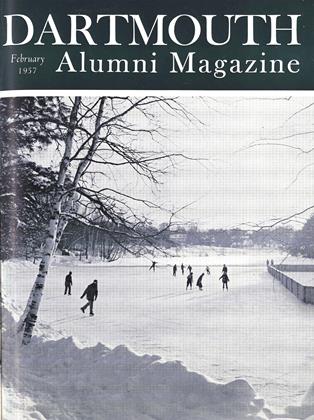An old Japanese proverb says: "A man who chases two rabbits catches none." Chic Igaya '57, captain of the Dartmouth ski team, has been chasing one rabbit for a long time now and has come within a whisker of catching him.
For Chic it has been skiing. It started when he was four. By ten he had beaten the Japanese slalom champion and by the time he was 20 he had won the All-Japan downhill-slalom three times. His father, the operator of a ski resort at Shiga Kogen, 100 miles north of Tokyo, was his teacher. His mother also skied and the family documented Chic's progress with hundreds of photographs - from the time when he was a sprout doing an arm-wing snowplow to recent shots of him slipping through a hairpin in international competition.
When the opportunity to attend an American college came, Chic says the choice was easy. But the first months at Dartmouth could have been discouraging. Language was the greatest problem and even though there was some comfort in taking a Japanese-English dictionary to finals, there just wasn't time to look up the words and write a good exam. He joined the English language class for foreign students and, word by word, began to gain ground.
There wasn't much skiing for him freshman year. The same concentration that has allowed him to "think only of the race" he carried over into his studies. If he didn't understand something in class, he talked it over with the professor and then worked and worked until it was clear. For a while he saw only one rabbit and it led him to Baker Library night after night.
His studies improved and his skiing did also. In this country he found the competition keener and, Chic says with respect, he found the Dartmouth ski team coach, Walter Prager, one of the greatest racers of all time. The old master and the bright new star worked closely together. Although Chic was one of the best skiers who had ever entered Dartmouth he has learned much in experience and technique in this country. He considers his opportunity to ski at Stowe with such racers as Stein Erickson and Othmar Schneider as a vital part of his development. The family album shows a definite change in his slalom style; most obviously, he now stands more erect which, he says, allows him to move quicker.
When talking with him about his skiing, it is easy to get the idea that he is in no way responsible for the racing record of Chiharu Igaya. Others are given credit for everything from the way he runs a flush to the wax job he rides on. There is never any mention of his courage in the downhill or of sometimes skiing competitively with an ankle so badly sprained that he can hardly walk. Chic has weak ankles. He has some consolation, however, when he is reminded of it. A doctor in St. Anton said that if his ankles weren't so flexible he wouldn't have his edge as a slalom runner. "You have the ankles of a ballerina," the doctor told him.
Chic's modesty and courtesy are carried with an easy grace. On the record, he is an international star, the owner of a considerable collection of ski trophies including a Silver Medal from the 1956 Olympics, and a national hero at home. In slalom he has a grace that few skiers have ever achieved, and yet he says, very sincerely, that his skiing is jerky and that, in time, he can be more graceful. His modesty commands authority and has helped to make him one of Dartmouth's greatest ski captains. Walter Prager says, 'Whatever you say about him won't be good enough." Chic turned down an offer to ski in Austria this Christmas vacation so he could train with his team - then accepted only after several snowless races had been cancelled and Prager urged him to go.
Chic's Major subject is geography. Ultimately, he will work for The American International Underwriters but now he is facing a decision about whether to attend graduate school in business administration or continue skiing competitively. (He is convinced that he cannot do both well.) As usual, he will think it over until he can see the whole course and then move ahead, as if the finish line were always the next gate
Chiharu Igaya '57
 View Full Issue
View Full Issue
More From This Issue
-
 Feature
FeatureSoldiers As Policy Makers
February 1957 By JOHN HURD '21 -
 Feature
FeatureBuilding for Today—and 1969
February 1957 By PROF. JOHN P. AMSDEN '20, -
 Feature
FeatureA Running Start
February 1957 -
 Feature
FeatureTo Make What's Good Better
February 1957 By R. L. A. -
 Class Notes
Class Notes1918
February 1957 By ERNEST H. EARLEY, W. CURTIS GLOVER, RICHARD P. WHITE -
 Class Notes
Class Notes1926
February 1957 By HERBERT H. HARWOOD, H. DONALD NORSTRAND
R.L.A.
Article
-
 Article
ArticleThe College In The Sixties
February 1940 -
 Article
ArticleMedicine and Morals
June 1960 -
 Article
ArticleStreeter Americana Auction Top Event in Book World
JANUARY 1967 -
 Article
ArticleOld-time Student Diversions
FEBRUARY 1963 By ALLEN R. FOLEY '20 -
 Article
ArticleOne Way to Build Morale?
November 1943 By P. S. M. -
 Article
ArticleEndings and Beginnings
JUNE 1982 By Peter Smith







